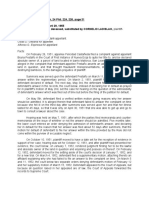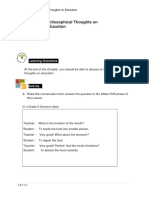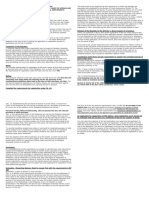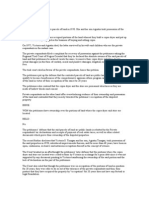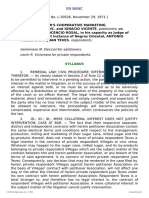15 Republic vs. San Lorenzo Dev Corp
15 Republic vs. San Lorenzo Dev Corp
Uploaded by
mei atienzaCopyright:
Available Formats
15 Republic vs. San Lorenzo Dev Corp
15 Republic vs. San Lorenzo Dev Corp
Uploaded by
mei atienzaCopyright
Available Formats
Share this document
Did you find this document useful?
Is this content inappropriate?
Copyright:
Available Formats
15 Republic vs. San Lorenzo Dev Corp
15 Republic vs. San Lorenzo Dev Corp
Uploaded by
mei atienzaCopyright:
Available Formats
15. REPUBLIC OF THE PHILIPPINES, petitioner vs.
SAN LORENZO DEVELOPMENT
CORPORATION (SLDC), respondent.
[G.R. No. 220902. February 17, 2020.]
FACTS: SLDC is a corporation duly organized and existing under Philippine laws and qualified to acquire
and own lands in the Philippines. On September 25, 1998, it filed an Application for registration of two
parcels of land situated in Barangay Buluang, Compostela, Cebu, under P.D. No. 1529 or the Property
Registration Decree.
In its application, SLDC alleged, among others, that it is the owner of the subject parcels of land,
having acquired the same by purchase sometime in 1994 and 1995; that it, together with the previous
owners thereof, has been in open, continuous, exclusive, and notorious possession and occupation of
the said parcels of land in the concept of an owner for over 30 years; and that said parcels of land are
part of the area generally declared as alienable and disposable. Aside from some witnesses, SLDC also
presented its documentary evidence to support its claims.
The RTC granted the application, however, the Republic of the Phils. thru the OSG argued that
SLDC failed to prove by well-nigh incontrovertible evidence that it has been in open, continuous,
exclusive, and notorious occupation of the subject parcels of land since June 12, 1945 or earlier to
establish its registrable title under Section 14 (1) of P.D. No. 1529. The CA affirmed the decision of the
RTC.
ISSUE: Whether the CA erred in granting SLDC's application under Section 14 (2) of P.D. No. 1529.
HELD:
No. The Court has consistently ruled that the applicant must present a copy of the original
classification approved by the DENR Secretary and certified as a true copy of the original land
classification approved by the legal custodian of such official records to establish that the land for
registration is alienable and disposable. In ruling in this wise, the Court explained that the CENRO or the
PENRO are not the official repository or legal custodian of the issuances of the DENR Secretary declaring
public lands as alienable and disposable. As such, the certifications they issue relating to the character of
the land cannot be considered prima facie evidence of the facts stated therein.
In this case, the required copy of original land classification of the subject lands was not
presented. Both the RTC and the CA merely relied on the Certifications issued by the CENRO and the
Regional Technical Director of the Lands Management Services of the DENR in ruling that the alienable
and disposable nature of the subject lands was established. Clearly, this is not sufficient to prove the
alienability and disposability of the subject lands.
Further, contrary to SLDC's contention, the fact that the alienable and disposable nature of the
subject lands was not contested by the Republic in its appeal before the CA, does not have the effect of
impliedly admitting, much less proving, that the subject lands are alienable and disposable. The
alienability and disposability of land are not among the matters that can be established by mere
admissions or even by mere agreement of the parties. The law and jurisprudence provide stringent
requirements to prove such fact. This is so because no less than the Constitution, provides for the
doctrine that all lands of the public domain belong to the State, which is the source of any asserted right
to ownership of land. As such, the courts are not only empowered, but in fact duty-bound, to ensure
that such ownership of the State is duly protected by the proper observance of the rules and
requirements on land registration. Again, the burden of proof in overcoming such presumption is upon
the person applying for registration.
As SLDC, in this case, evidently failed to discharge such burden and thus failed to comply with
the primary requisite of proving the alienability and disposability of the subject lands, this Court finds no
necessity to belabor on the other requirements for registration under Article 14 (2) of P.D. No. 1529. The
decision of the CA is reversed and set aside. SLDC’s application is denied.
You might also like
- Malabanan v. RepublicDocument2 pagesMalabanan v. RepublicDox VidalNo ratings yet
- 1 Republic v. CADocument5 pages1 Republic v. CAkjhenyo218502No ratings yet
- Republic v. Yap (Case Digest)Document4 pagesRepublic v. Yap (Case Digest)Dan Christian Dingcong Cagnan100% (1)
- Page 31 - Inchausti vs. de Leon (#57)Document2 pagesPage 31 - Inchausti vs. de Leon (#57)danielNo ratings yet
- Director of Lands v. FuntilarDocument2 pagesDirector of Lands v. Funtilarrodel talabaNo ratings yet
- Contracts Articles 1317-1328Document5 pagesContracts Articles 1317-1328Monique AcostaNo ratings yet
- Chapter 1: Philosophical Thoughts On EducationDocument15 pagesChapter 1: Philosophical Thoughts On EducationEdivon Mission100% (3)
- LTD Consolidated Case DigestsDocument122 pagesLTD Consolidated Case DigestsKevin Ken Sison Ganchero100% (1)
- Heirs of Maximo Sanjorjo V Heirs of Manuel Quijano To Republic V MangatoraDocument7 pagesHeirs of Maximo Sanjorjo V Heirs of Manuel Quijano To Republic V MangatoraCzarina UmilinNo ratings yet
- Reyes vs. Montemayor G.R. NO. 166516 September 3, 2009 I. FactsDocument1 pageReyes vs. Montemayor G.R. NO. 166516 September 3, 2009 I. FactsRose Vivialyn LumasacNo ratings yet
- Sy v. CapistranoDocument3 pagesSy v. CapistranoPhilAeonNo ratings yet
- Ong Vs Republic of The Philippines (Land Titles)Document2 pagesOng Vs Republic of The Philippines (Land Titles)Chem Mae100% (2)
- Digest Republic v. LapinaDocument3 pagesDigest Republic v. LapinaAna Altiso100% (3)
- Spouses Laburada v. LRA, G.R. No. 101387. March 11, 1998 - Case DigestDocument3 pagesSpouses Laburada v. LRA, G.R. No. 101387. March 11, 1998 - Case DigestGee100% (2)
- Ruiz V DimailigDocument2 pagesRuiz V Dimailigneil peirce100% (1)
- G.R. No. 223660, April 02, 2018 Valderama V Arguelles (Angeles)Document2 pagesG.R. No. 223660, April 02, 2018 Valderama V Arguelles (Angeles)Gennard Michael Angelo Angeles100% (3)
- Legarda Vs Saleeby Digest (Torrens)Document2 pagesLegarda Vs Saleeby Digest (Torrens)Kristine Joy Tumbaga100% (6)
- GR No 122539Document1 pageGR No 122539Kat JolejoleNo ratings yet
- G.R. No. 123346 mANOTOK DigestDocument5 pagesG.R. No. 123346 mANOTOK DigestJona CalibusoNo ratings yet
- 12 Heirs of Jesus M. Mascuñana vs. Court of AppealsDocument2 pages12 Heirs of Jesus M. Mascuñana vs. Court of AppealsJemNo ratings yet
- Serna Vs Ca. LTDDocument3 pagesSerna Vs Ca. LTDfjl_302711No ratings yet
- Emma Ver Reyes Vs MontemayorDocument3 pagesEmma Ver Reyes Vs MontemayorBea Vanessa AbellaNo ratings yet
- Baranda Vs GustiloDocument5 pagesBaranda Vs GustiloThrees SeeNo ratings yet
- DBP v. The Acting Register of Deeds of Nueva EcijaDocument2 pagesDBP v. The Acting Register of Deeds of Nueva Ecijatrishortiz100% (1)
- De Santos vs. City of Manila, 45 SCRA 409 (Case Digest)Document1 pageDe Santos vs. City of Manila, 45 SCRA 409 (Case Digest)AycNo ratings yet
- Heirs of Maximo Sanjorjo v. Heirs of Manuel Y. Quijano, 449 SCRA 15 (2005)Document3 pagesHeirs of Maximo Sanjorjo v. Heirs of Manuel Y. Quijano, 449 SCRA 15 (2005)Carie LawyerrNo ratings yet
- Cagatao v. AlmonteDocument1 pageCagatao v. AlmontejenizacallejaNo ratings yet
- People Vs CaingletDocument2 pagesPeople Vs Caingletaaa100% (1)
- Reyes v. Raval Reyes Case DigestDocument2 pagesReyes v. Raval Reyes Case DigestBeulah Alanah EspirituNo ratings yet
- Eland Philippines Inc. vs. Garcia, GR No. 173289, Feb. 17, 2010 DigestDocument4 pagesEland Philippines Inc. vs. Garcia, GR No. 173289, Feb. 17, 2010 DigestXyrus BucaoNo ratings yet
- Litam Vs EspirituDocument4 pagesLitam Vs EspirituJay Kent RoilesNo ratings yet
- Zenaida Ramos Balalio Vs Eusebio Ramos Et Al GR# 168464Document1 pageZenaida Ramos Balalio Vs Eusebio Ramos Et Al GR# 168464mitchNo ratings yet
- JOSEPHINE WEE, Petitioner v. FELICIDAD MARDO, RespondentDocument2 pagesJOSEPHINE WEE, Petitioner v. FELICIDAD MARDO, RespondentPepper PottsNo ratings yet
- Padilla vs. Phils. Producers Coop.Document2 pagesPadilla vs. Phils. Producers Coop.rhodz 88No ratings yet
- Gonzales vs. IACDocument2 pagesGonzales vs. IACAdi HernandezNo ratings yet
- Felix Ting Ho, JR., Et. Al. vs. Vicente Teng GuiDocument2 pagesFelix Ting Ho, JR., Et. Al. vs. Vicente Teng GuiGregarius CarinoNo ratings yet
- G.R. No. 150413 REP VS. LAO 405 SCRA 291 PDFDocument3 pagesG.R. No. 150413 REP VS. LAO 405 SCRA 291 PDFjolina cumpio100% (1)
- Acap VS CA Case DigestDocument1 pageAcap VS CA Case DigestHopey100% (2)
- BACHRACH CORPORATION Petitioner Vs THE HONORABLE COURT OF APPEALS and PHILIPPINES PORTS AUTHORITY RespondentsDocument2 pagesBACHRACH CORPORATION Petitioner Vs THE HONORABLE COURT OF APPEALS and PHILIPPINES PORTS AUTHORITY Respondentspaterson M agyaoNo ratings yet
- 17 Lumanlaw vs. Hon. PeraltaDocument2 pages17 Lumanlaw vs. Hon. PeraltaquasideliksNo ratings yet
- Semirara Coal Corporation vs. HGL Development CorporationDocument4 pagesSemirara Coal Corporation vs. HGL Development CorporationSachuzen230% (1)
- Case Digest in LTDDocument37 pagesCase Digest in LTDNica09_foreverNo ratings yet
- The Facts AreDocument2 pagesThe Facts AreYanyan MarianneNo ratings yet
- Eland Philippines v. Garcia Et AlDocument2 pagesEland Philippines v. Garcia Et AlRodRalphZantua100% (1)
- GSIS V SantiagoDocument3 pagesGSIS V SantiagoNiño CarbonillaNo ratings yet
- Clarin v. Rulona, 127 SCRA 512Document1 pageClarin v. Rulona, 127 SCRA 512YANG FLNo ratings yet
- Land TitlesDocument5 pagesLand Titleswilfred100% (1)
- Case #1 Bobie Rose D. V. Frias vs. Alcayde G.R. No. 194262, February 28, 2018 Tijam, J.: FactsDocument16 pagesCase #1 Bobie Rose D. V. Frias vs. Alcayde G.R. No. 194262, February 28, 2018 Tijam, J.: FactsJayNo ratings yet
- Civil Procedure Case Digest (Silverio vs. FBCI and Perez vs. Manotok)Document3 pagesCivil Procedure Case Digest (Silverio vs. FBCI and Perez vs. Manotok)Maestro LazaroNo ratings yet
- LTD Case Digests Part 1Document10 pagesLTD Case Digests Part 1Owen BuenaventuraNo ratings yet
- Almeda v. Court of Appeals, GR No. 85322, April 30, 1991Document1 pageAlmeda v. Court of Appeals, GR No. 85322, April 30, 1991Jeorge Ryan Mangubat0% (1)
- QUINTOS - Summary JudgmentDocument2 pagesQUINTOS - Summary JudgmentadeeNo ratings yet
- Vda. de Herrera Vs BernardoDocument2 pagesVda. de Herrera Vs BernardoArthur John GarratonNo ratings yet
- REPUBLIC OF THE PHILIPPINES v. AMOR HACHERO AND THE RD OF PALAWANDocument1 pageREPUBLIC OF THE PHILIPPINES v. AMOR HACHERO AND THE RD OF PALAWANElaine Belle OgayonNo ratings yet
- Republic Vs EspinosaDocument3 pagesRepublic Vs EspinosaJoel G. AyonNo ratings yet
- Carvajal Vs CA Property DigestDocument3 pagesCarvajal Vs CA Property DigestJohn Benedict TigsonNo ratings yet
- Heirs of Zara Pelagio and Mindanao Vs Director of LandsDocument2 pagesHeirs of Zara Pelagio and Mindanao Vs Director of LandsAlexandra Desamparado100% (1)
- Padilla, Jr. v. Phil. Producers Cooperative Marketing Assoc., Inc., GR 141256, July 15, 2005, 463 SCRA 480Document1 pagePadilla, Jr. v. Phil. Producers Cooperative Marketing Assoc., Inc., GR 141256, July 15, 2005, 463 SCRA 480Gia DimayugaNo ratings yet
- Alviola V CADocument2 pagesAlviola V CAbatusay575No ratings yet
- GR 173088 Aparejo Report On LTD FinalDocument8 pagesGR 173088 Aparejo Report On LTD FinalmarlonNo ratings yet
- Dagdag V NepomucenoDocument1 pageDagdag V NepomucenoKat JolejoleNo ratings yet
- Chapter 5 - Group 1 - LTD RevisedDocument7 pagesChapter 5 - Group 1 - LTD RevisedCheryl P. Gaño100% (1)
- 3 Hygienic Packaging Corp. v. Nutri-Asia, Inc.Document20 pages3 Hygienic Packaging Corp. v. Nutri-Asia, Inc.mei atienzaNo ratings yet
- Philippine Long Distance Telephone Company, Inc. vs. City of BacolodDocument1 pagePhilippine Long Distance Telephone Company, Inc. vs. City of Bacolodmei atienzaNo ratings yet
- Jardine Davis Insurance vs. AliposaDocument2 pagesJardine Davis Insurance vs. Aliposamei atienzaNo ratings yet
- 1 Daniel vs. E.B. VillarosaDocument6 pages1 Daniel vs. E.B. Villarosamei atienzaNo ratings yet
- Coca Cola Bottlers vs. City of ManilaDocument2 pagesCoca Cola Bottlers vs. City of Manilamei atienzaNo ratings yet
- 5 Batama Farmer's Cooperative Marketing Association, Inc. v. RosalDocument9 pages5 Batama Farmer's Cooperative Marketing Association, Inc. v. Rosalmei atienzaNo ratings yet
- Pepsi-Cola Bottling Co. vs. Municipality of Tanauan, LeyteDocument2 pagesPepsi-Cola Bottling Co. vs. Municipality of Tanauan, Leytemei atienzaNo ratings yet
- Drilon vs. LimDocument2 pagesDrilon vs. Limmei atienzaNo ratings yet
- 2 People vs. ComilingDocument3 pages2 People vs. Comilingmei atienzaNo ratings yet
- PEOPLE OF THE PHILIPPINES, Plaintiff-Appellee VS. ISABELO PUNO y GUEVARRA, Alias "Beloy," and ENRIQUE AMURAO y PUNO, Alias "Enry," Accused-AppellantsDocument3 pagesPEOPLE OF THE PHILIPPINES, Plaintiff-Appellee VS. ISABELO PUNO y GUEVARRA, Alias "Beloy," and ENRIQUE AMURAO y PUNO, Alias "Enry," Accused-Appellantsmei atienzaNo ratings yet
- People of The Philippines, Petitioner vs. Cora Abella Ojeda, RespondentDocument3 pagesPeople of The Philippines, Petitioner vs. Cora Abella Ojeda, Respondentmei atienza100% (1)
- 9 Taisei Shimizu vs. COADocument1 page9 Taisei Shimizu vs. COAmei atienza100% (1)
- 4 Heirs of Marcelino Nepomuceno vs. NAESSDocument1 page4 Heirs of Marcelino Nepomuceno vs. NAESSmei atienzaNo ratings yet
- 12 Pascual vs. Pangyarihan AngDocument1 page12 Pascual vs. Pangyarihan Angmei atienzaNo ratings yet
- 8 Montenegro vs. COADocument1 page8 Montenegro vs. COAmei atienzaNo ratings yet
- 3 Basa vs. Senly LoyDocument2 pages3 Basa vs. Senly Loymei atienzaNo ratings yet
- Respondent.: (G.R. No. 206331. June 4, 2018.)Document2 pagesRespondent.: (G.R. No. 206331. June 4, 2018.)mei atienzaNo ratings yet
- Prescribed Supplemental AffidavitDocument6 pagesPrescribed Supplemental Affidavitzanderhero30No ratings yet
- ABM G12 Business Ethics - Fairness, Justice, Accountability and TransparencyDocument1 pageABM G12 Business Ethics - Fairness, Justice, Accountability and TransparencymauuiNo ratings yet
- Shadow Side of StrengthsDocument2 pagesShadow Side of Strengthsapi-657561077No ratings yet
- Nicholas D. Smith - Socrates On Self-Improvement - Knowledge, Virtue, and Happiness-Cambridge University Press (2021)Document202 pagesNicholas D. Smith - Socrates On Self-Improvement - Knowledge, Virtue, and Happiness-Cambridge University Press (2021)Angela Marcela López RendónNo ratings yet
- Categories of Audience AnalysisDocument2 pagesCategories of Audience Analysisreign acostaNo ratings yet
- Adama During The Time of LemuriaDocument2 pagesAdama During The Time of Lemuriamichaela doriaNo ratings yet
- 7.form 04 - Authorization Application FormDocument3 pages7.form 04 - Authorization Application FormTran Vu Viet HoangNo ratings yet
- ROXAS - Self-Reflection of Becoming A HeroDocument3 pagesROXAS - Self-Reflection of Becoming A HeromonicaNo ratings yet
- Writ Petition Against Dismisal of 22-A CR.P.C (Waqas Haider - Zahid Sarwar)Document14 pagesWrit Petition Against Dismisal of 22-A CR.P.C (Waqas Haider - Zahid Sarwar)Asad SaeedNo ratings yet
- Factors Affecting The Tax Non-Compliance Attitude: April 2015Document8 pagesFactors Affecting The Tax Non-Compliance Attitude: April 2015Kristy Dela CernaNo ratings yet
- Study Unit 4.1: The Theory of Demand: The Utility ApproachDocument35 pagesStudy Unit 4.1: The Theory of Demand: The Utility ApproachZiphelele VilakaziNo ratings yet
- Stoning The TreeDocument14 pagesStoning The Treejadenkendel100% (1)
- The+Six+Pillars+of+Self Esteem+by+Nathaniel+BrandenDocument1 pageThe+Six+Pillars+of+Self Esteem+by+Nathaniel+Branden› PHXNTOM; ‹No ratings yet
- Chinese Literature PresentationDocument7 pagesChinese Literature Presentationyanna reyesNo ratings yet
- The Ends of Human Act EthicsDocument18 pagesThe Ends of Human Act EthicsHannah Jean LemorenasNo ratings yet
- Service Request /review Form: Sleen India Biz Venture PVT LTD (An Institutional AFMEC Lab)Document1 pageService Request /review Form: Sleen India Biz Venture PVT LTD (An Institutional AFMEC Lab)Merchant :: MD OverseasNo ratings yet
- RPD Daily Incident Report 2/16/24Document4 pagesRPD Daily Incident Report 2/16/24inforumdocsNo ratings yet
- Lecture 3. Corporate Social ResponsibilityDocument29 pagesLecture 3. Corporate Social ResponsibilityZoey ChangNo ratings yet
- Sexuality OldStrugglesandNewChallengesDocument18 pagesSexuality OldStrugglesandNewChallengesphaeze.hosseiniNo ratings yet
- Redacted Ir Artifact k12Document2 pagesRedacted Ir Artifact k12api-508308138No ratings yet
- Uhv BitsDocument16 pagesUhv BitsSampath RoxxNo ratings yet
- WHR 23Document166 pagesWHR 23Fabrice Floch100% (1)
- 09 Homework 1Document5 pages09 Homework 1anjineth lapulapuNo ratings yet
- Distance LoveDocument8 pagesDistance Loveworkformat37No ratings yet
- YILKAL ABATE TARIKU EBMS ToT Trainers Contract 2024Document6 pagesYILKAL ABATE TARIKU EBMS ToT Trainers Contract 2024Yilkal AbateNo ratings yet
- Empowering Sustainability and ESG Integration in Islamic Finance - Opinion - The Jakarta PostDocument6 pagesEmpowering Sustainability and ESG Integration in Islamic Finance - Opinion - The Jakarta PostFarhan Ibn AtiqNo ratings yet
- Grad. Invitation EditedDocument6 pagesGrad. Invitation EditedJester MabutiNo ratings yet
- RICS Qualification BrochureDocument8 pagesRICS Qualification BrochureManikNo ratings yet



